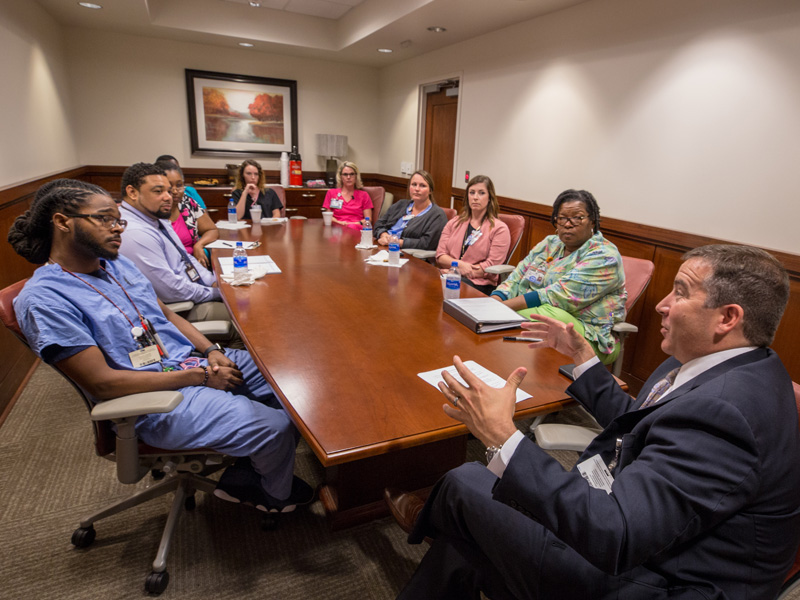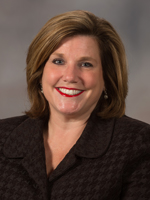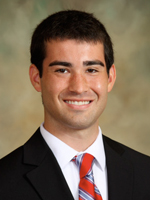UMMC employees can make their voice heard through annual engagement survey

What’s employee engagement, anyway?
The short answer: It’s how connected you feel to your place of employment. It’s your connection to the purpose of your organization and its goals, and your connection to your coworkers.
Using a confidential survey created by a national leader in improving patient and employee experience, the University of Mississippi Medical Center queried its 10,000 employees in July 2016 and July 2017. The results revealed both challenges and opportunities in the key areas of going above and beyond, communication, diversity and inclusion, professional development, patient and employee experience, and patient quality and safety.

This year, from July 9 to August 1, employees again can let their voices be heard through the Employment Engagement and Culture of Safety surveys. About 89 percent of health system employees took part last summer, said Cathy Smith, University Hospital and Health System chief of human resources. This time, the goal is 90 percent.
Press Ganey, the national firm that conducts the survey, “is always amazed, because their average is just 74 percent participation,” Smith said. When non-health system employees are factored in, UMMC stood at 81 percent in 2017, still well above the Press Ganey average.
Only employees and faculty who provide direct care or services to patients will take the Culture of Safety Survey, including some contracted workers in environmental, food and laundry services.
For the first time, part-time employees will be included. Also, faculty won’t take the Employee Engagement Survey this year because they are completing a similar survey this fall. If a faculty member is a clinical employee, he or she will still take the Culture of Safety Survey, Smith said.
On July 9, employees will receive an email from Press Ganey that includes a unique link to the engagement survey that takes about 20 minutes to complete. Employees should not forward their email, because their link can only be used by one person.
UMMC managers and administrators won't know who did or didn’t take part and won't have access to individual survey responses, but they will know how many total employees participated. However, if less than five employees in a work unit take the survey, that work unit won’t get survey results. Instead, the responses roll up to the next level of the organization. “This is just another way Press Ganey protects the confidentiality of survey participants,” Smith said.
“We won’t ask, and Press Ganey won’t release individual surveys,” Smith said. “We receive aggregate data from Press Ganey as well as a detailed analysis to use for improvement efforts.”
In the 2017 survey, six key engagement areas received more positive responses than the year before. They include:
- I would like to be working at this organization three years from now.
- I am proud to tell people that I work for this organization.
- Overall, I’m a satisfied employee. I would recommend this organization as a good place to work.
The greatest improvements were made in responses received to statements that include:
- The person I report to is a good communicator.
- The person I report to cares about my job satisfaction and treats me with respect.
- This organization makes employees in my work unit want to go above or beyond.

After the 2017 survey, six teams mainly comprised of front-line staff from different disciplines were recruited to find solutions for concerns in the key areas. Their vehicle was the 100 Day Workout, “a nationally recognized quality improvement methodology that brings together employees to tackle performance, throughput, quality, safety, engagement and other issues,” said Daniel Enger, Health System operational improvement director.
For example, the Communications Team created the “People of the U” Facebook page and designed an employee toolbox accessed through the Yellow Pages on the Intranet that gives quick links and references to information employees search for most often. “Front-line staff said it was hard to find things on the Intranet, and one of the hardest was the current holiday schedule,” Smith said.
The Patient Quality and Safety Team created a Clinical Quality webpage that outlines UMMC’s quality programs and goals. And, the Professional Development Team created U Med Cred, digital credentials that deliver an innovative way for learners to share successes, new skills and other professional advancements you might not find on a resume or transcript.
When she served on the Employee and Patient Experience Team, “we discovered that our patient admissions packet was very cumbersome,” said Zan Martin, a registered nurse and infection preventionist. “We realized we needed to have a shorter version, and that we weren’t accommodating some of the patients coming through our doors because the language was too difficult for some of them to understand.”
The committee is continuing its work to pare down the information and make what remains easy to read and understand, she said.
The other 100 Day Workout teams were Going Above and Beyond and Diversity and Inclusion.
The survey item raising the most concern in 2016 and 2017 was about pay. UMMC has made, and is continuing to make, targeted compensation adjustments to staff who are the furthest from their respective market averages since the last survey, Smith said. UMMC has made the commitment to conduct regular, comprehensive compensation reviews, she said.
Schedule time in your day to take the survey, Smith suggests.
“At UMMC Grenada, the overall participation was 94 percent,” Smith said. “When it comes to employee engagement, every voice is important.”


